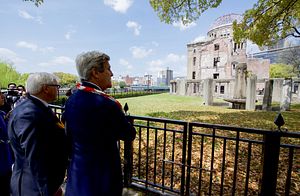Now that Secretary of State John Kerry has become the highest-ranking American official to visit Hiroshima, the door has been opened for U.S. President Barack Obama to make a far more momentous decision to visit the site of the American atomic bombing during his visit to Japan next month. The president came close to such a visit in his first term and understandably held off. A visit would inevitably be construed by many as a de facto U.S. apology for a decision that most Americans, not least veterans of that great conflict, view as a justified act to end a horrific war. It would be seen as vindication for Japanese claims of victimization, encouraging those in Japan who still deny responsibility for a war of aggression.
Despite those risks, and they cannot be taken lightly, there are two compelling reasons now for a presidential visit to the atomic bombing sites. The first is the need, at a time when there is loose talk on the campaign trail about the use and even the encouragement of the spread of nuclear weapons, to remind the world of the terrible cost associated with the use of atomic weapons. The second is that a visit would provide a spur to tentative but significant steps toward historical reconciliation over still unfinished issues of the war in Northeast Asia.
For Obama, in particular, such a visit can be an occasion to reaffirm his vision of moving toward a nuclear-free world, solidifying an important legacy of his foreign policy. The president should acknowledge the human suffering, on a massive scale, caused by the nuclear attacks and thus the ongoing importance of the goals he set out in his 2009 Prague speech to reduce and ultimately eliminate nuclear weapons from the arsenals of the world. This has clear urgency given the ongoing expansion of North Korea’s nuclear arsenal, the continuing threat of a nuclear-armed Iran, and the latent nuclear capacity of many nations around the world. But it has added import when the presidential candidates seem to believe that it is acceptable now to contemplate the use of nuclear weapons in conflict and encourage allies, even Japan, to build nuclear arsenals as a substitute for an American presence.
The second goal of a presidential visit to the nuclear bombing sites is to finally come to terms with the morally difficult decisions made in World War II. For the most part, Americans and Japanese have moved past their wartime hostility to create an enduring friendship and alliance. But the American failure to officially acknowledge the victims of the atomic bombings remains a source of pain for many Japanese. It is time to do so and Obama is the right person.
As the White House undoubtedly understands, this must be carried out with great caution and care. If a Hiroshima visit were construed as an official apology, it would trigger a strong reaction from many Americans, not only form veterans but from the children and grandchildren of those who fought and died in that war. Most American historians still believe President Harry Truman’s decision to use atomic bombs shortened a war that, if it continued, would have led to far greater Japanese and American casualties. Any second-guessing of that wartime judgment would be counterproductive to achieving reconciliation. It could even have the unintended consequence of validating Japan’s victim consciousness and bolstering the historical amnesia that overlooks Japan’s own responsibility for wartime atrocities toward its Asian neighbors.
Most importantly, an American presidential visit should not merely be an effort to strengthen the U.S.-Japan bilateral relationship. Rather, the primary reason for the visit should be to activate a larger process of historical reconciliation that includes Northeast Asian nations as well as the United States. Most Japanese who support a U.S. presidential visit see its merit mainly in terms of removing the historical thorn that exists between the United States and Japan. However, if such a visit were taken only to reaffirm the U.S.-Japan alliance, it would create grave and widespread concerns — particularly among Chinese and Koreans — that the United States is ready to sweep aside Japan’s wartime crimes in Asia.
Japan and South Korea have only recently reached a compromise agreement to finally offer compensation and apology to the so-called “comfort women” compelled into sexual service in Japan’s wartime brothels. It remains a fragile agreement, not yet implemented, and many other wartime issues — such as the compensation for hundreds of thousands of Asians and Allied POWs dragooned into forced labor — remain unresolved.
The powerful image of an American president ready to finally confront the brutal and morally questionable acts of the war can only be truly successful if he can use it to press for similar actions on the part of the Japanese toward their Asian neighbors. It is also time for the Japanese prime minister to visit Nanjing to pay tribute to the victims of the 1937 massacre and to apologize personally to the handful of Korean “comfort women” still alive. And Americans could reasonably expect the Japanese leader to visit Pearl Harbor and finally acknowledge Japan’s responsibility for aggression.
President Obama should go to Hiroshima to say no to irresponsible rhetoric about nuclear weapons, and to leave a legacy of opening the door to historic reconciliation in Northeast Asia.
Professor Gi-Wook Shin is the Director of the Shorenstein Asia-Pacific Research Center at Stanford University and Daniel Sneider is the Associate Director for Research of the Center. They are co-authors of a forthcoming book, Divergent Memories, about elite opinion and wartime memory in Asia.
































